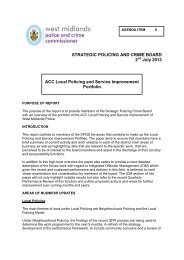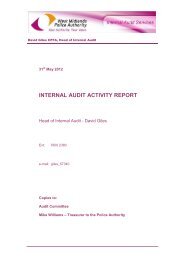Strategic Policing and Crime Board information pack
Strategic Policing and Crime Board information pack
Strategic Policing and Crime Board information pack
- No tags were found...
Create successful ePaper yourself
Turn your PDF publications into a flip-book with our unique Google optimized e-Paper software.
West Midl<strong>and</strong>s <strong>Strategic</strong> <strong>Policing</strong> <strong>and</strong> <strong>Crime</strong> <strong>Board</strong>Information for applicants for the roles ofAssistant Police <strong>and</strong> <strong>Crime</strong> Commissioners<strong>and</strong>Non-Executive <strong>Board</strong> Members
Contents1. Welcome2. About the West Midl<strong>and</strong>s <strong>and</strong> West Midl<strong>and</strong>s Police3. The role of West Midl<strong>and</strong>s Police <strong>and</strong> <strong>Crime</strong> Commissioner4. <strong>Strategic</strong> priorities5. <strong>Strategic</strong> <strong>Policing</strong> <strong>and</strong> <strong>Crime</strong> <strong>Board</strong>6. Appointment <strong>and</strong> selection process
West Midl<strong>and</strong>s Police <strong>and</strong> <strong>Crime</strong> CommissionerClosing date for applications: noon on 28 January 2013Dear ApplicantWelcomeThank you for your interest in the role of an Assistant Police <strong>and</strong> <strong>Crime</strong>Commissioner or Non-Executive <strong>Board</strong> Member of West Midl<strong>and</strong>s <strong>Strategic</strong> <strong>Policing</strong><strong>and</strong> <strong>Crime</strong> <strong>Board</strong>. I am seeking three Assistant Commissioners <strong>and</strong> 3 Non-Executive<strong>Board</strong> Members to work with me <strong>and</strong> my Deputy Police <strong>and</strong> <strong>Crime</strong> Commissioner,Councillor Yvonne Mosquito. I hope that successful appointees can take up theirposts on 1 April 2013.I have the challenging role of ensuring that the 2.74 million people of the WestMidl<strong>and</strong>s are served by an efficient <strong>and</strong> effective police force. The force is thelargest provincial force in the country with a budget in excess of £600m <strong>and</strong> around7,700 police officers <strong>and</strong> 3,800 police staff headed by the Chief Constable, ChrisSims.The world of policing is dynamic <strong>and</strong> dem<strong>and</strong>ing. The West Midl<strong>and</strong>s is a large,diverse <strong>and</strong> complex policing area. To meet the challenging agenda I face, I amestablishing a <strong>Strategic</strong> <strong>Policing</strong> <strong>and</strong> <strong>Crime</strong> <strong>Board</strong> to work as a team under myleadership. Positions on the <strong>Board</strong> offer the opportunity to deliver my commitment toimprove the lives of the public of the West Midl<strong>and</strong>s. I want the people of the WestMidl<strong>and</strong>s to have pride in their police. I welcome applications from anyone with agenuine interest in policing <strong>and</strong> the delivery of high quality services <strong>and</strong> performance.To assist you in completing your application I have provided background <strong>information</strong>about my office <strong>and</strong> West Midl<strong>and</strong>s Police Force. However please do contact us on0121 626 6060 should you wish to discuss the post further.I look forward to receiving your application.Kind regardsBob JonesWest Midl<strong>and</strong>s Police <strong>and</strong> <strong>Crime</strong> Commissioner
2. About the West Midl<strong>and</strong>s <strong>and</strong> West Midl<strong>and</strong>s PoliceWest Midl<strong>and</strong>s Police is the second largest police force in the country behind London’sMetropolitan Police Service. It covers an area of 384 square miles <strong>and</strong> serves apopulation of 2.74 million (over 1 million households). The region sits at the very heart ofthe country <strong>and</strong> covers the three major cities of Birmingham, Coventry <strong>and</strong>Wolverhampton. It also includes the busy <strong>and</strong> thriving districts of Dudley, S<strong>and</strong>well,Solihull <strong>and</strong> Dudley. The majority of the area is densely populated but there are somerural areas.The region’s economy has diversified from its historic heavy industry roots of theIndustrial Revolution. With the decline in traditional manufacturing, both the public <strong>and</strong>private sectors have rejuvenated the area. Birmingham now has a commercial <strong>and</strong>shopping area which is among the largest in Europe. This is complemented by a widerange of social amenities such as the National Exhibition Centre, National Indoor Arena,the International Convention Centre, theatres, galleries <strong>and</strong> many large conferencefacilities. The area boasts a thriving nightlife, centred around Birmingham City Centre.West Midl<strong>and</strong>s hosts a number of Premiership <strong>and</strong> Championship football clubs togetherwith many others in the other leagues.The region is well served by rail <strong>and</strong> road links. Road <strong>and</strong> rail travel is supplemented bysignificant air traffic through Birmingham International <strong>and</strong> Coventry airports. The area isproud of its academic institutions, being home to a number of universities located inBirmingham, Coventry, Walsall <strong>and</strong> Wolverhampton.The population of the West Midl<strong>and</strong>s is diverse. At approximately 18%, the percentageof the population that are black <strong>and</strong> minority ethnic is significantly above the nationalaverage. Approximately 10% of the population were born outside of the UK. Theaverage earnings <strong>and</strong> house prices for the region are lower than the national average.There are seven local authorities within the area, Birmingham, Coventry, Dudley,S<strong>and</strong>well, Solihull, Walsall <strong>and</strong> Wolverhampton, each with a <strong>Crime</strong> <strong>and</strong> DisorderReduction Partnership/Community Safety Partnership. The area is also served by threeLocal Enterprise Partnerships (LEPs), Staffordshire <strong>and</strong> West Midl<strong>and</strong>s Probation Trust<strong>and</strong> a number of NHS structures, adding complexity to the partnership l<strong>and</strong>scape.West Midl<strong>and</strong>s Police is one of the best performing metropolitan police forces in thecountry. Significant <strong>and</strong> sustained reductions across volume crime have been achieved.At the same time, through headquarter departments <strong>and</strong> formal collaborativearrangements with other forces <strong>and</strong> law enforcement agencies, resources <strong>and</strong> expertisehave been focused on a range of inter <strong>and</strong> cross-force activities.Local policing is delivered through ten local policing units (LPUs). Other thanBirmingham, which because of its size has four LPUs, the other six LPUs arecoterminous with local authority boundaries. Each LPU is headed by a ChiefSuperintendent. The work of the local LPUs is supported by a number of specialistcentral <strong>and</strong> support departments.West Midl<strong>and</strong>s Police has a reputation for continuous improvement, innovation <strong>and</strong>empowering leadership with a talent to continuously evolve <strong>and</strong> meet changing needs.The Force aims to deliver policing that is accessible <strong>and</strong> responds to the needs of localpeople. Neighbourhood policing provides a named team of local officers who caninfluence the policing priorities within their neighbourhood. They work with colleagues<strong>and</strong> partner agencies to address the concerns of their communities.
3. Role of the West Midl<strong>and</strong>s Police <strong>and</strong> <strong>Crime</strong> CommissionerThere are 41 police <strong>and</strong> crime commissioners in Engl<strong>and</strong> <strong>and</strong> Wales covering each ofthe 41 forces outside of London. The governance of the Metropolitan Police Service is aduty of the Mayor of London <strong>and</strong> the City of London Corporation governs the City ofLondon Police. Together with the Home Secretary <strong>and</strong> chief police officers, we areresponsible for the management of policing in Engl<strong>and</strong> <strong>and</strong> Wales.The West Midl<strong>and</strong>s Police <strong>and</strong> <strong>Crime</strong> Commissioner is the local governing body forpolicing in the West Midl<strong>and</strong>s. The Commissioner has an over-arching duty to secure aneffective <strong>and</strong> efficient police force. The Commissioner has a number of statutory roles,which include:representing all those who live <strong>and</strong> work in the communities in their force area<strong>and</strong> identifying their policing needssetting priorities that meet those needs by agreeing a police <strong>and</strong> crime planholding the Chief Constable to account for achieving the Commissioner’spriorities as efficiently <strong>and</strong> effectively as possiblesetting the force budget <strong>and</strong> setting the precepthiring <strong>and</strong>, if necessary, dismissing the Chief ConstableTo fulfil these roles, the Commissioner has a range of powers <strong>and</strong> responsibilities. TheCommissioner:must produce a Police <strong>and</strong> <strong>Crime</strong> Planmust set the policing "precept", which is the part of local council tax that goes topolicingappoints <strong>and</strong>, if necessary, dismisses the Chief Constablemakes <strong>Crime</strong> <strong>and</strong> Disorder Reduction Grantshas oversight of how complaints against the police are managedmust keep under review opportunities for collaborationhas duties relating to national criminal threats, safeguarding of children, <strong>and</strong>consulting the publichas a role in ensuring the effectiveness of the wider criminal justice systemThe Commissioner is supported in his work by an executive team headed by the ChiefExecutive <strong>and</strong> Monitoring Officer, Jacky Courtney. The team also has theCommissioner’s Chief Financial Officer, Mike Williams, a Legal Adviser, Michael Blamire-Brown together with a policy <strong>and</strong> administrative team of twelve staff <strong>and</strong> an Internal AuditTeam of six staff.The Commissioner is supported <strong>and</strong> scrutinised by a separate Police <strong>and</strong> <strong>Crime</strong> Panel.The Panel is made up of twelve councillors from across the West Midl<strong>and</strong>s <strong>and</strong> two
independent members. Information on the work of the Panel can be found atwww.birmingham.gov.uk/wmpcp. The Panel is set up under the provisions of the PoliceReform <strong>and</strong> Social Responsibility Act 2011.Further <strong>information</strong> on the work of the Commissioner <strong>and</strong> the statutory framework inwhich the Commissioner works can be found on the Commissioner’s website.www.westmidl<strong>and</strong>s-pcc.gov.ukInformation on West Midl<strong>and</strong>s Police can be found at www.west-midl<strong>and</strong>s.police.uk
4. <strong>Strategic</strong> prioritiesUnder section 5 of the Police Reform <strong>and</strong> Social Responsibility Act 2011 theCommissioner is required to issue a police <strong>and</strong> crime plan (the Plan) within the financialyear in which the election is held i.e. 31 March 2013. The Plan is required to cover the:Commissioner’s police <strong>and</strong> crime objectivespolicing which the Chief Constable is to providefinancial <strong>and</strong> other resources which the Commissioner will provide to theChief Constablemeans by which the Chief Constable will report to the Commissioner onthe provision of policingmeans by which the Chief Constable’s performance will be measuredcrime <strong>and</strong> disorder reduction grants which the Commissioner is to make<strong>and</strong> the conditions to which such grants are to be madeThe Plan is required to cover the term of office of the Commissioner, although it ispossible to vary the Plan during this period. The Commissioner does expect to revisitthe Plan annually to take account of financial settlements <strong>and</strong> ensure that the Plancontinues to reflect the needs of local people. The Police <strong>and</strong> <strong>Crime</strong> Panel is required toreview the draft Plan <strong>and</strong> to make a report or recommendations having conducted itsreview. The Commissioner must have regard to any report or recommendations <strong>and</strong>provide <strong>and</strong> publish his response to the Panel’s report.The Commissioner wants to ensure that his Plan captures the voice of the public in howit is set <strong>and</strong> develops. It is vital that the Plan enables effective local working <strong>and</strong> buildsupon the strong sense of civic identity in each of the seven local authority areas <strong>and</strong> theirneighbourhoods. For this reason the Plan will have West Midl<strong>and</strong>s wide outcomes <strong>and</strong>measures but will be built upon local policing <strong>and</strong> crime plans for each of the areas. Theestablishment of local police <strong>and</strong> crime boards, a manifesto commitment by theCommissioner, will enable the public to shape police <strong>and</strong> crime priorities.While the police <strong>and</strong> crime objectives set by the Commissioner in the West Midl<strong>and</strong>swide plan are intended to be relevant for the Plan’s duration the development of the planwill be reviewed each year with annual priorities reflecting the public voice <strong>and</strong> theprofessional assessment of the police <strong>and</strong> partners. A diagrammatic representation ofhow the Commissioner intends the planning process to operate, reflecting hiscommitment to the public driving the work of the Force, is shown in this <strong>pack</strong>. This is todeliver the Commissioner’s ambition <strong>and</strong> vision that the public of the West Midl<strong>and</strong>shave pride in their police service believing it to be ‘their’ service.As the largest force outside of London, West Midl<strong>and</strong>s Police contributes heavily to thesafety of the whole country, not just the West Midl<strong>and</strong>s. The Force provides nationalcounter-terrorism capability <strong>and</strong> a large proportion of operational assets that support UKpolicing at times of need. The Commissioner is required to have regard to the <strong>Strategic</strong><strong>Policing</strong> Requirement (SPR) which is issued by the Home Secretary <strong>and</strong> sets out herview of the national threats that the police must address. In addition to counter-terrorismthe SPR deals with civil contingencies, organised crime, public order <strong>and</strong> cyber-attacks.
The <strong>Strategic</strong> <strong>Policing</strong> Requirement aspect of the Plan will detail how the Commissionerwill ensure that the Chief Constable can meet this national requirement.The Plan will also reflect the ongoing development of the Force as reflected in a numberof change programmes managed by the Chief Constable. The Plan will also include thekey work conducted by the Force <strong>and</strong> the Commissioner with partners across the WestMidl<strong>and</strong>s.The Plan must be reviewed by the Police <strong>and</strong> <strong>Crime</strong> Panel. This will be done inFebruary 2013. However, the Commissioner hopes that the Panel will support hisintended West Midl<strong>and</strong>s wide outcomes which are as follows:<strong>Crime</strong> <strong>and</strong> offending are reduced.People are protected from harm.Communities are strong <strong>and</strong> successful.People receive a good <strong>and</strong> caring service.<strong>Policing</strong> becomes more productive <strong>and</strong> effective.Strong partnerships are built to increase safety.Confidence in policing is high.
Pride in our police<strong>Crime</strong> <strong>and</strong>offendingis reducedPeople areprotected fromharmCommunities arestrong <strong>and</strong>successfulPeople receive agood <strong>and</strong> caringservice<strong>Policing</strong> becomes moreproductive <strong>and</strong>effectiveThere are strongpartnerships forsafetyConfidence inpolicing is highCommissioner’s manifesto, engagement with WMP partners, strategic policing requirement <strong>and</strong> strategic assessmentBirmingham<strong>Policing</strong> <strong>and</strong><strong>Crime</strong> <strong>Board</strong>Coventry<strong>Policing</strong> <strong>and</strong><strong>Crime</strong> <strong>Board</strong>Solihull<strong>Policing</strong> <strong>and</strong> <strong>Crime</strong><strong>Board</strong>Walsall<strong>Policing</strong> <strong>and</strong> <strong>Crime</strong><strong>Board</strong>Dudley<strong>Policing</strong> <strong>and</strong> <strong>Crime</strong><strong>Board</strong>Wolverhampton<strong>Policing</strong> <strong>and</strong> <strong>Crime</strong><strong>Board</strong>S<strong>and</strong>well<strong>Policing</strong> <strong>and</strong><strong>Crime</strong> <strong>Board</strong>Neighbourhood priorities
5. <strong>Strategic</strong> <strong>Policing</strong> <strong>and</strong> <strong>Crime</strong> <strong>Board</strong>The purpose of the <strong>Strategic</strong> <strong>Policing</strong> <strong>and</strong> <strong>Crime</strong> <strong>Board</strong> is to ensure that the Commissioner is ableto effectively engage <strong>and</strong> represent all areas of the West Midl<strong>and</strong>s <strong>and</strong> to support theCommissioner in his role of ensuring an efficient <strong>and</strong> effective police service for the West Midl<strong>and</strong>sthrough the setting of the strategic direction for the Force <strong>and</strong> holding the Chief Constable toaccount for the exercise of his functions.The principal terms of reference for the <strong>Board</strong>, which will work as a team under the leadership <strong>and</strong>direction of the Commissioner, are to:maintain an overview of the implementation of the Commissioner’s manifesto in order to ensureconsistency in approach but having regard to the differing needs in the West Midl<strong>and</strong>smonitor the implementation <strong>and</strong> achievement of the Police <strong>and</strong> <strong>Crime</strong> Plan <strong>and</strong> support theCommissioner in any work required to vary the Plan during his term of officescrutinise, support <strong>and</strong> challenge the overall performance of the force including against thepriorities agreed within the Planadvise the Commissioner in exercising his functions in setting the budget <strong>and</strong> precept.ensure the effective working of arrangements for consulting with <strong>and</strong> engaging local residents,communities <strong>and</strong> victims of crimeensure effective working with the local policing <strong>and</strong> crime boards <strong>and</strong> advise the Commissioneron their effectiveness in achieving the outcomes from his award of crime <strong>and</strong> disorderreduction grants.advise <strong>and</strong> support the Commissioner in his decision making role <strong>and</strong> in holding the ChiefConstable to accountsupport the Commissioner more generally in the fulfilment of his statutory duties, to includeequalities <strong>and</strong> human rights obligations.The <strong>Board</strong> will comprise 8 members, including the Commissioner, the Deputy Police <strong>and</strong> <strong>Crime</strong>Commissioner (DPCC), 3 Assistant Police <strong>and</strong> <strong>Crime</strong> Commissioners (APCCs) <strong>and</strong> 3 Nonexecutive<strong>Board</strong> members.Appointments of the three Assistant Police <strong>and</strong> <strong>Crime</strong> Commissioners will be on a geographicbasis with responsibility for the following areas:-Coventry <strong>and</strong> SolihullWalsall <strong>and</strong> WolverhamptonDudley <strong>and</strong> S<strong>and</strong>wellThe DPCC already has responsibility for the Birmingham area.The DPCC <strong>and</strong> the APCCs will have some functions delegated to them <strong>and</strong> will have particularroles to engage with the local policing <strong>and</strong> crime boards <strong>and</strong> other local geographical structures.Local policing <strong>and</strong> crime boards are a commitment in the Commissioner’s manifesto. The three
non-executive members will be full members of the <strong>Board</strong>. It is not envisaged that they will begiven individual delegated responsibilities.The three Non-executive members will be full members of the <strong>Board</strong> <strong>and</strong> will beexpected to provide an independent element of challenge. The three Non-executive members ofthe <strong>Board</strong> will also be expected to form part of the membership of the Joint Audit Committee asrequired under a statutory Financial Code of Practice. The Audit Committee supports both theCommissioner <strong>and</strong> the Chief Constable. The inclusion of the three Non-executive members on theCommittee is supported by the Chief Constable. However, the Chief Constable will not have a rolein their selection. It is expected that the Audit Committee will comprise a total of five memberswith the other two members being joint appointments of the Chief Constable <strong>and</strong> Commissioner.It is expected that the <strong>Board</strong> will meet regularly on a monthly basis. Meetings are likely to takeplace on a Tuesday. The <strong>Board</strong> will meet in public. The Commissioner has asked the Police <strong>and</strong><strong>Crime</strong> Panel to nominate one of its members to attend <strong>and</strong> have observer status at the <strong>Board</strong>’smeetings.The role profiles of the Commissioner, Deputy Commissioner, Assistant Police <strong>and</strong> <strong>Crime</strong>Commissioners <strong>and</strong> the Non-Executive <strong>Board</strong> members are shown in the following tables. Theseare drawn from the work conducted by the Senior Salaries Review <strong>Board</strong> to determine the salary tobe payable to Commissioners.
Employees <strong>and</strong> subordinates.Customer service – this is the extent towhich the jobholder has an impact oncustomers, suppliers or others outside theorganisation, distinguishing betweenjobholders who have a direct <strong>and</strong> anindirect external impact.Decision making – the impact <strong>and</strong>complexity of decision making, includingthe range of factors to be taken intoaccount <strong>and</strong> the extent to which<strong>information</strong> is likely to be ambiguous orconflicting. In considering theresponsibility for decision making, it isnecessary to take account of the range of<strong>information</strong> that has to be dealt with by thejobholder <strong>and</strong> the extent to which this<strong>information</strong> may be conflicting or unclearThe post has a direct impact on local communitiesthrough the Chief Constable whose operationalindependence is maintained. This means the ChiefConstable has operational responsibility for theallocation of resources within an agreed Police <strong>and</strong><strong>Crime</strong> Plan <strong>and</strong> the PCC will not be directly involvedin operational decisions on a daily or weekly basis.Furthermore, all decision making relating toresponses to specific incidents or events will remainwith the Chief Constable.The decision making responsibilities relate to:Setting the strategic direction <strong>and</strong> objectivesof the Force.Deciding on the budget <strong>and</strong> the allocation ofassets <strong>and</strong> funds;The appointment <strong>and</strong> where necessary, theremoval of the Chief Constable;Managerial decisions as to how to hold theChief Constable to account <strong>and</strong> to maintainan efficient <strong>and</strong> effective police force for thepolice area.DPCCTo act as the PCC in theevent of the absence orunavailability of the PCCTo support the PCC generallyin the exercise of the PCC’sstatutory functionsTo proactively contribute tothe working of the <strong>Strategic</strong>Knowledge:-<strong>Crime</strong> <strong>and</strong> policing strategy <strong>and</strong> policy <strong>and</strong>PCC manifestoLocal <strong>and</strong> community issues, covering largegeographical areas, often with different issues<strong>and</strong> complexities in rural <strong>and</strong> urban issuesGovernance <strong>and</strong> finance matters, as required.
<strong>Policing</strong> <strong>and</strong> <strong>Crime</strong> <strong>Board</strong>To exercise such decisionmaking powers as may bedelegatedTo undertake on behalf of thePCC community engagement<strong>and</strong> consultation activitiesSpecialist skills:-LeadershipChairing meetingsNetworking with community interestsProblem solvingHolding to account<strong>Strategic</strong> budget managementPeople skills:-Communication with citizens <strong>and</strong> local groupsparticularly in BirminghamWorking with the Chief Constable <strong>and</strong> othersenior officersWorking with local policing board(s)Customer service:-Involvement in case work <strong>and</strong> complaintsDecision making:-Delegated decision makingContribution to <strong>Strategic</strong> <strong>Board</strong> discussionAdvice to PCC in decision making roleAssistantPCCTo proactively contribute tothe working of the <strong>Strategic</strong><strong>Policing</strong> <strong>and</strong> <strong>Crime</strong> <strong>Board</strong>To advise the PCC indecision makingTo represent the PCCKnowledge:-<strong>Crime</strong> <strong>and</strong> policing strategy <strong>and</strong> policy <strong>and</strong>PCC manifestoLocal <strong>and</strong> community issues, coveringparticular geographical areas.Governance <strong>and</strong> finance matters, as required
interests in a geographicalarea <strong>and</strong> highlighting localissues of concernTo attend communityengagement <strong>and</strong> consultationevents <strong>and</strong> meetingsTo exercise delegated powerswhere grantedSpecialist skills:-People skills:-Leadership in the particular geographical areaChairing meetingsNetworking with community interestsProblem solvingHolding to account<strong>Strategic</strong> budget managementCommunication with citizens <strong>and</strong> local groupsparticularly in BirminghamWorking with the Chief Constable <strong>and</strong> othersenior officersWorking with local policing board(s)Customer service:-Involvement in case work <strong>and</strong> complaintsarising in a particular geographical areaDecision making:-Delegated decision makingContribution to <strong>Strategic</strong> <strong>Board</strong> discussionAdvice to PCC in decision making roleNonexecutiveTo proactively contribute tothe working of the <strong>Strategic</strong><strong>Policing</strong> <strong>and</strong> <strong>Crime</strong> <strong>Board</strong>To advise the PCC indecision makingKnowledge:-<strong>Crime</strong> <strong>and</strong> policing strategy <strong>and</strong> policy <strong>and</strong>PCC manifestoGovernance <strong>and</strong> finance matters, as requiredUnderst<strong>and</strong>ing of the audit role <strong>and</strong> function
To act as a critical friend tothe PCC, DPCC <strong>and</strong> the<strong>Strategic</strong> <strong>Policing</strong> <strong>and</strong> <strong>Crime</strong><strong>Board</strong>To act as a member of theCommissioner’s <strong>and</strong> ChiefConstable’s Joint AuditCommitteeSpecialist skills:-People skills:-AnalyticalProblem solvingHolding to account<strong>Strategic</strong> budget managementTeam working in <strong>and</strong> the <strong>Strategic</strong> <strong>Policing</strong><strong>and</strong> <strong>Crime</strong> <strong>Board</strong> <strong>and</strong> providing intelligentchallengeWorking with the Chief Constable <strong>and</strong> othersenior officersDecision making:-Contribution to <strong>Strategic</strong> <strong>Board</strong> discussionAdvice to PCC in decision making role
6. APPOINTMENT AND SELECTION PROCESSThe selection process will be based upon the principles set out in the Code of Practice publishedby the Commissioner for Public Appointments which relate to ministerial appointments to publicbodies. The three basic principles are that appointments be made on merit by an objective, fair <strong>and</strong>open selection process.The closing date for applications will be noon on 28 January 2013. Shortlisting will take place on12 February 2013 by the Commissioner <strong>and</strong> DPCC. The Commissioner will invite arepresentative of the Police <strong>and</strong> <strong>Crime</strong> Panel to also be included in the selection process.Interviews will take place on 6 <strong>and</strong> 14 March 2013. The interview panel will comprise theCommissioner, DPCC <strong>and</strong>, if agreed by the Panel, a representative of the Police <strong>and</strong> <strong>Crime</strong> Panelwho will act in an observer capacity. The appointment decision will be that of the Commissioner,supported by the DPCC.Applications must consist of:a completed application forma covering letter stating whether the applicant wishes to be considered for :oooan Assistant Police <strong>and</strong> <strong>Crime</strong> Commissioner, with an indication of whether theapplication is for the role to cover Wolverhampton <strong>and</strong> Walsall, Dudley <strong>and</strong>S<strong>and</strong>well or Coventry <strong>and</strong> Solihull;a Non-Executive <strong>Board</strong> member; orboth an Assistant Police <strong>and</strong> <strong>Crime</strong> Commissioner, with geographic indication asabove, <strong>and</strong> a Non-Executive <strong>Board</strong> member.TERMS OF APPOINTMENTPersons appointed to the <strong>Board</strong> will not be members of the Commissioner’s staff, nor will they beemployees. They will be engaged on a contract for services with detailed terms <strong>and</strong> conditionswhich will secure the proper performance of their role in the public interest. Appointees will not bepolitically restricted. A detailed list of the terms of appointment is set out in this <strong>pack</strong>.APCCs will be engaged for the duration of the current period of office of theCommissioner <strong>and</strong> the contract for services will be liable for termination by the Commissioner atany time with immediate effect without any further payment other than outst<strong>and</strong>ing fees. Thecontract for services will include a requirement for regular reviews of performance under thecontract.Fees will be paid at the rate of £22,500 per annum in respect of each APCC <strong>and</strong> £7,500 perannum for each Non-executive <strong>Board</strong> member.The services provided under contract will require attendance at <strong>Board</strong> meetings <strong>and</strong> asrequired at meetings representing the Commissioner including the Local <strong>Policing</strong> <strong>and</strong> <strong>Crime</strong><strong>Board</strong>s being established as part of the Commissioner’s manifesto commitments.The time commitment expected of APCCs will be between 6 <strong>and</strong> 10 days per month <strong>and</strong> in thecase of Non-executive <strong>Board</strong> members an average of 1 to 2 days per month. Attendance at
equired meetings <strong>and</strong> events will be monitored <strong>and</strong> failure to attend meetings without good reasonmay lead to deduction from fees or termination of the contract.SELECTION CRITERIAAll applicants will be required to demonstrate that they meet the following selection criteria forappointment to <strong>Board</strong> membership:• A commitment to the manifesto commitments of the Commissioner• Experience in governance of a public body <strong>and</strong> governing board membership (essential)• Experience in governance in a policing body (desirable)• Skill in public engagement <strong>and</strong> consultation• Skill in questioning, probing <strong>and</strong> holding to account• Skill in strategic management of budgets• Communication skills• Knowledge of the current issues affecting policing <strong>and</strong> community safetyApplicants for the APCC posts will be subject to the following additional criteria:-• Knowledge of the current issues affecting policing <strong>and</strong> community safety in Coventry <strong>and</strong>Solihull or Walsall <strong>and</strong> Wolverhampton or Dudley <strong>and</strong> S<strong>and</strong>well with residency in the areapreferred• Experience of decision making• Flexibility to accommodate other meetings <strong>and</strong> events as required by the Commissioner
APPOINTMENT OF ASSISTANT POLICE AND CRIME COMMISSIONERS AND NON-EXECUTIVE BOARD MEMBERSSUMMARY OF PROPOSED TERMS AND CONDITIONS OF APPOINTMENT1. Terms <strong>and</strong> conditions of appointment:-a) Appointees will not be employees or members of staff of the PCC <strong>and</strong> will be engagedunder a contract for services. The applicant must acknowledge that there is nocontract of employment with the PCC.b) Appointees will be required to provide the contracted services with due care, skill <strong>and</strong>to act in the best interests of the PCC in accordance with the directions <strong>and</strong> powers ofthe PCC.c) Qualification provisions – applicants must:-a. Be over 18 years of age;b. Be resident in the West Midl<strong>and</strong>s County;c. Not be a serving police officer or employed police staff;d. Not be subject to a bankruptcy or debt relief order or restriction;e. Not be subject to disqualification as a company director;f. Not within 5 years prior to the date of the application have been convicted in theUK, the Channel Isl<strong>and</strong>s or the Isle of Man of an offence <strong>and</strong> has had passed asentence of imprisonment (whether suspended or not) for a period of not lessthan three months. (Full disclosure of previous convictions will be required.)g. Satisfy the citizenship condition as set out in Section 68 of the Police Reform <strong>and</strong>Social Responsibility Act 2011.d) Appointees will be responsible for payment of income tax <strong>and</strong> national insurance.e) Any claims made against the PCC in respect of services provided to the PCC under thecontract for services shall be the responsibility of the appointee. This includes anyclaims for tax <strong>and</strong> national insurance liabilities. Appointees will be required to indemnifythe PCC in respect of any liability, costs <strong>and</strong> expenses.f) Appointees will be required to have indemnity insurance in respect of public liability <strong>and</strong>negligence in undertaking duties (appointees will however be indemnified when actingunder delegation from the PCC <strong>and</strong> carrying out PCC duties <strong>and</strong> functions in goodfaith).g) Appointees will be contracted for the duration of the PCC’s terms of office <strong>and</strong>appointments will terminate in the event of the PCC ceasing to hold office for anyreason or in the event of the PCC giving notice of removalh) Appointments will be made to an individual person only <strong>and</strong> not to a corporate body<strong>and</strong> accordingly any fees will only be payable to the individual appointed.i) The appointee will not be permitted under any circumstances to sub-contract the workinvolved in the appointment. Any additional work required by a third party will besubject to separate contractual arrangements undertaken through the PCC’s office.j) Notice of removal may take effect at any time <strong>and</strong> no period of notice will be required.k) There will be no obligation on the PCC to pay any fees or damages in the event oftermination in respect of early termination except fees payable to the date oftermination only.
l) Fees – will be paid gross on the first day of each month without any element of gratuityor additional fee on delivery of an invoice from the appointee. If the appointee isregistered for VAT, VAT shall be charged at the prevailing rate.m) Expenses will be paid for reasonable travelling <strong>and</strong> subsistence expenses incurred inrespect of business undertaken on behalf of the PCC at the same amounts as paid tothe PCC. Claims must be made in accordance with any expenses scheme <strong>and</strong> must besupported by receipts <strong>and</strong> only for expenditure actually incurred.n) Vetting – appointees will be subject to vetting in accordance with the Vetting Policy ofthe PCCo) Conduct – appointees will be subject to the PCC’s code of conduct <strong>and</strong> will at all timesbe required to conform to the principles of conduct in public life (Nolan Principles).p) Conflicts of interest – appointees will be required to declare pecuniary interestsincluding detail of other paid offices held <strong>and</strong> such interests will be included in thepublished register of interests. Appointees will have an on-going obligation toimmediately declare in writing any matter which may represent a conflict of interestbetween the service to be provided <strong>and</strong> other or personal interests of the appointee<strong>and</strong> to comply with such directions as may be given by the PCC in order to avoid ormitigate the effect of such a conflict of interest.q) Service commitment – appointees will be generally required to make themselvesavailable for meetings <strong>and</strong> attendance at other events as required by the PCC. Failureto attend meetings may lead to termination of the contract for services.r) In the event of an appointee failing or being unable to provide services as required, thePCC shall be informed without delay as to the reason for the failure or inability toprovide service.s) Appointees will be required to provide such equipment <strong>and</strong> resources as are requiredto effectively undertake their role. This includes office space, IT equipment (includingemail provisions), stationery <strong>and</strong> vehicles. The use of IT for the purpose of theprovision of services will be subject to a policy which will require that any confidential orrestricted <strong>information</strong> is subject to appropriate safeguards. PCC resources may beused for sending out communications in the name of the PCC in accordance withofficial PCC business only.t) Appointees are not subject to restriction on political activities but in undertaking theprovision of services are required not to undertake any political activities in their ownname whilst undertaking PCC business or give the impression that the resources of thePCC as local policing body are being used for party political purposes.u) Appointees will be required to comply with relevant policies <strong>and</strong> procedures as relate tostaff.v) Appointees authorised to exercise delegated powers on behalf of the PCC shall beunder a fiduciary duty to exercise such powers properly, in accordance with the law<strong>and</strong> professional advice of the statutory officers of the Office of the PCC.w) Appointees shall only have power to authorise expenditure in accordance with theauthority <strong>and</strong> direction <strong>and</strong> in accordance with the policies of the PCC.
x) Confidentiality clause – appointees will be under a duty of confidentiality to the PCC<strong>and</strong> must indemnify the PCC in respect of the consequences of any unauthoriseddisclosure of confidential <strong>information</strong>.y) Data Protection – the appointee is responsible for determining whether therequirements of the service require registration as a data controller.z) Freedom of Information – appointees have an obligation to ensure that the PCC is ableto comply with the requirements of the Freedom of Information Act 2000.aa) Ownership of material – all material produced under the contract is to be owned byPCC <strong>and</strong> shall not to be re-used for any purpose other than in connection with thePCC’s functions without the consent of the PCC.bb) The appointee will be required <strong>and</strong> be under a continuing duty following termination ofthe appointment to account for <strong>and</strong> return to the PCC all property <strong>and</strong> assets, includingdigital media used by the appointee in connection with the service.
The Ten General Principles of Public LifeSelflessness – members should serve only the public interest <strong>and</strong> should never improperly conferan advantage or disadvantage on any person.Honesty <strong>and</strong> integrity – members should not place themselves in situations where their honesty<strong>and</strong> integrity may be questioned, should not behave improperly, <strong>and</strong> should on all occasions avoidthe appearance of such behaviour.Objectivity – members should make decisions on merit, including when making appointments,awarding contracts, or recommending individuals for rewards or benefits.Accountability – members should be accountable to the public for their actions <strong>and</strong> the manner inwhich they carry out their responsibilities, <strong>and</strong> should co-operate fully <strong>and</strong> honestly with anyscrutiny appropriate to their particular office.Openness – members should be as open as possible about their actions <strong>and</strong> those of theirauthority, <strong>and</strong> should be prepared to give reasons for those actions.Personal judgement – members may take account of the views of others, including their politicalgroups, but should reach their own conclusions on the issues before them <strong>and</strong> act in accordancewith those conclusions.Respect for others – members should promote equality by not discriminating against any person,<strong>and</strong> by treating people with respect, regardless of their race, age, religion, gender, sexualorientation or disability. They should respect the impartiality <strong>and</strong> integrity of the authority’s statutoryofficers <strong>and</strong> its other employees.Duty to uphold the law – members should uphold the law <strong>and</strong>, on all occasions, act inaccordance with the trust that the public is entitled to place in them.Stewardship – members should do whatever they are able to do to ensure that their authoritiesuse their resources prudently, <strong>and</strong> in accordance with the law.Leadership – members should promote <strong>and</strong> support these principles by leadership, <strong>and</strong> byexample, <strong>and</strong> should act in a way that secures or preserves public confidence.
















